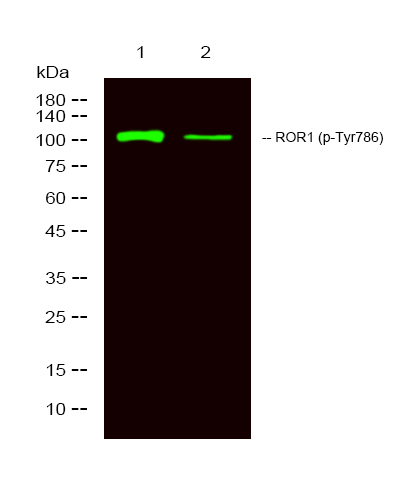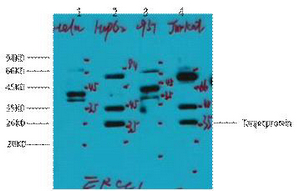ROR1 (Phospho Tyr786) rabbit pAb
- Catalog No.:YP1694
- Applications:WB
- Reactivity:Human;Mouse;Rat
- Target:
- ROR1
- Fields:
- >>Wnt signaling pathway
- Gene Name:
- ROR1 NTRKR1
- Protein Name:
- ROR1 (Phospho-Tyr786)
- Human Gene Id:
- 4919
- Human Swiss Prot No:
- Q01973
- Mouse Gene Id:
- 26563
- Mouse Swiss Prot No:
- Q9Z139
- Immunogen:
- Synthesized peptide derived from human ROR1 (Phospho-Tyr786)
- Specificity:
- This antibody detects endogenous levels of ROR1 (Phospho-Tyr786) at Human, Mouse,Rat
- Formulation:
- Liquid in PBS containing 50% glycerol, 0.5% BSA and 0.02% sodium azide.
- Source:
- Polyclonal, Rabbit,IgG
- Dilution:
- WB 1:500-2000
- Purification:
- The antibody was affinity-purified from rabbit serum by affinity-chromatography using specific immunogen.
- Concentration:
- 1 mg/ml
- Storage Stability:
- -15°C to -25°C/1 year(Do not lower than -25°C)
- Other Name:
- Tyrosine-protein kinase transmembrane receptor ROR1 (EC 2.7.10.1) (Neurotrophic tyrosine kinase, receptor-related 1)
- Observed Band(KD):
- 105kD
- Background:
- This gene encodes a receptor tyrosine kinase-like orphan receptor that modulates neurite growth in the central nervous system. The encoded protein is a glycosylated type I membrane protein that belongs to the ROR subfamily of cell surface receptors. It is a pseudokinase that lacks catalytic activity and may interact with the non-canonical Wnt signalling pathway. This gene is highly expressed during early embryonic development but expressed at very low levels in adult tissues. Increased expression of this gene is associated with B-cell chronic lymphocytic leukaemia. Alternative splicing results in multiple transcript variants encoding different isoforms. [provided by RefSeq, Jun 2012],
- Function:
- catalytic activity:ATP + a [protein]-L-tyrosine = ADP + a [protein]-L-tyrosine phosphate.,developmental stage:Expressed at high levels during early embryonic development. The expression levels drop strongly around day 16 and there are only very low levels in adult tissues.,function:Tyrosine-protein kinase receptor whose role is not yet clear.,similarity:Belongs to the protein kinase superfamily. Tyr protein kinase family. ROR subfamily.,similarity:Contains 1 FZ (frizzled) domain.,similarity:Contains 1 Ig-like C2-type (immunoglobulin-like) domain.,similarity:Contains 1 kringle domain.,similarity:Contains 1 protein kinase domain.,tissue specificity:Expressed strongly in human heart, lung, and kidney, but weakly in the CNS. The short isoform is strongly expressed in fetal and adult CNS and in a variety of human cancers, including those originating from CNS or PNS neuroectoderm.,
- Subcellular Location:
- Membrane ; Single-pass type I membrane protein. Cell projection, axon .
- Expression:
- Expressed strongly in human heart, lung and kidney, but weakly in the CNS. Isoform Short is strongly expressed in fetal and adult CNS and in a variety of human cancers, including those originating from CNS or PNS neuroectoderm.
- June 19-2018
- WESTERN IMMUNOBLOTTING PROTOCOL
- June 19-2018
- IMMUNOHISTOCHEMISTRY-PARAFFIN PROTOCOL
- June 19-2018
- IMMUNOFLUORESCENCE PROTOCOL
- September 08-2020
- FLOW-CYTOMEYRT-PROTOCOL
- May 20-2022
- Cell-Based ELISA│解您多样本WB检测之困扰
- July 13-2018
- CELL-BASED-ELISA-PROTOCOL-FOR-ACETYL-PROTEIN
- July 13-2018
- CELL-BASED-ELISA-PROTOCOL-FOR-PHOSPHO-PROTEIN
- July 13-2018
- Antibody-FAQs
- Products Images

- Western Blot analysis of 1 Hela, 2 treated with LPS 100ng/mL 20mim,using primary antibody at 1:1000 dilution. Secondary antibody(catalog#:RS23920) was diluted at 1:10000



